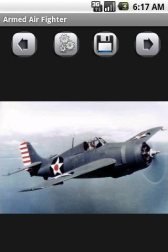Armed Air Fighter Photography android apk free download

 Name - Armed Air Fighter Photography
Name - Armed Air Fighter PhotographyCategory - reference
Resolution - multi
Type - Android 1.6 Donut
Size - 6912 KB
Rating - 2/5 from 77 ratings
| Rate this app: | |
| 2969 downloads | |
Description:
Ver 1.2, for Android OS 1.6 and up
A fighter aircraft is a military aircraft designed primarily for air-to-air combat with other aircraft, as opposed to a bomber, which is designed primarily to attack ground targets by dropping bombs. The hallmarks of a fighter are its small size, speed and maneuverability.
Many fighters have secondary ground-attack capabilities, and some are dual-roled as fighter-bombers. Consequently, the term "fighter" is sometimes extended colloquially to include dedicated ground-attack aircraft.
Fighters are the primary means by which armed forces gain air superiority over their opponents in battle. Since at least World War II, achieving and maintaining this air superiority has been a key component of victory in warfare, particularly conventional warfare (as opposed to guerrilla warfare). The purchase, training and maintenance of a fighter fleet therefore consumes a substantial proportion of the defense budgets of modern armed forces.
Although the term "fighter" technically refers to aircraft designed to shoot down other aircraft, such designs are often also useful as multirole fighter-bombers, strike fighters, and sometimes lighter, fighter-sized tactical ground-attack aircraft. For example, in World War II the US Navy would later favor fighters over dedicated dive bombers, and the P-47 Thunderbolt would be favored for ground attack. The controversial F-111 would be employed as a strike bomber as the fighter variant was abandoned. Bombers generally refer to long-range strategic or theater bombing roles. This blurring follows the use of fighters from their earliest days for "attack" or "strike" operations against enemy troops, field positions, vehicles, and facilities by means of strafing or dropping of bombs or incendiaries.
Some of the most expensive fighters such as the F-14 Tomcat, F-22 Raptor and F-15 Eagle were employed as all-weather interceptors as well as air superiority combat aircraft, only developing air-to-ground roles late in their careers. Multirole fighter-bombers such as the F/A-18 Hornet are often less expensive and tasked (and in this case, given an F/A designation) with ground attack as part of a "high-low mix", or in the case of the Super Hornet, replacing a range of specialized aircraft types.
Fighters were developed in response to the fledgling use of aircraft and dirigibles in World War I for reconnaissance and ground-attack roles. Early fighters were very small and lightly armed by later standards, and were mostly biplanes. As aerial warfare became increasingly important, so did control of the airspace. By World War II, fighters were predominantly all-metal monoplanes with wing-mounted batteries of cannons or machine guns. By the end of the war, turbojet engines were already beginning to replace piston engines as the means of propulsion, and increasingly sophisticated refinements to armament were already appearing.
Modern jet fighters are predominantly powered by one or two turbofan engines, and are equipped with a radar as the primary method of target acquisition. Armament consists primarily of air-to-air missiles (from as few as two on some lightweight day fighters to as many as eight or twelve on air superiority fighters like the Sukhoi Su-27 or Boeing F-15 Eagle), with a cannon as backup armament (typically between 20 and 30 mm in caliber); however, they can also employ air-to-surface missiles, as well as guided and unguided bombs.
List of fighters in service:
- Boeing F/A-18E/F Super Hornet
- British Aerospace Sea Harrier
- Dassault Mirage 2000
- Dassault Mirage 2000N/2000D
- Dassault Rafale
- Eurofighter Typhoon
- Grumman F-14 Tomcat
- McDonnell Douglas F-15 Eagle
- General Dynamics F-16 Fighting Falcon
- McDonnell Douglas F-15E Strike Eagle
- McDonnell Douglas F/A-18 Hornet
- Lockheed Martin F-22 Raptor
- Lockheed Martin F-35 Lightning II
Ver 1.2, for Android OS 1.6 and up
A fighter aircraft is a military aircraft designed primarily for air-to-air combat with other aircraft, as opposed to a bomber, which is designed primarily to attack ground targets by dropping bombs. The hallmarks of a fighter are its small size, speed and maneuverability.
Many fighters have secondary ground-attack capabilities, and some are dual-roled as fighter-bombers. Consequently, the term "fighter" is sometimes extended colloquially to include dedicated ground-attack aircraft.
Fighters are the primary means by which armed forces gain air superiority over their opponents in battle. Since at least World War II, achieving and maintaining this air superiority has been a key component of victory in warfare, particularly conventional warfare (as opposed to guerrilla warfare). The purchase, training and maintenance of a fighter fleet therefore consumes a substantial proportion of the defense budgets of modern armed forces.
Although the term "fighter" technically refers to aircraft designed to shoot down other aircraft, such designs are often also useful as multirole fighter-bombers, strike fighters, and sometimes lighter, fighter-sized tactical ground-attack aircraft. For example, in World War II the US Navy would later favor fighters over dedicated dive bombers, and the P-47 Thunderbolt would be favored for ground attack. The controversial F-111 would be employed as a strike bomber as the fighter variant was abandoned. Bombers generally refer to long-range strategic or theater bombing roles. This blurring follows the use of fighters from their earliest days for "attack" or "strike" operations against enemy troops, field positions, vehicles, and facilities by means of strafing or dropping of bombs or incendiaries.
Some of the most expensive fighters such as the F-14 Tomcat, F-22 Raptor and F-15 Eagle were employed as all-weather interceptors as well as air superiority combat aircraft, only developing air-to-ground roles late in their careers. Multirole fighter-bombers such as the F/A-18 Hornet are often less expensive and tasked (and in this case, given an F/A designation) with ground attack as part of a "high-low mix", or in the case of the Super Hornet, replacing a range of specialized aircraft types.
Fighters were developed in response to the fledgling use of aircraft and dirigibles in World War I for reconnaissance and ground-attack roles. Early fighters were very small and lightly armed by later standards, and were mostly biplanes. As aerial warfare became increasingly important, so did control of the airspace. By World War II, fighters were predominantly all-metal monoplanes with wing-mounted batteries of cannons or machine guns. By the end of the war, turbojet engines were already beginning to replace piston engines as the means of propulsion, and increasingly sophisticated refinements to armament were already appearing.
Modern jet fighters are predominantly powered by one or two turbofan engines, and are equipped with a radar as the primary method of target acquisition. Armament consists primarily of air-to-air missiles (from as few as two on some lightweight day fighters to as many as eight or twelve on air superiority fighters like the Sukhoi Su-27 or Boeing F-15 Eagle), with a cannon as backup armament (typically between 20 and 30 mm in caliber); however, they can also employ air-to-surface missiles, as well as guided and unguided bombs.
List of fighters in service:
- Boeing F/A-18E/F Super Hornet
- British Aerospace Sea Harrier
- Dassault Mirage 2000
- Dassault Mirage 2000N/2000D
- Dassault Rafale
- Eurofighter Typhoon
- Grumman F-14 Tomcat
- McDonnell Douglas F-15 Eagle
- General Dynamics F-16 Fighting Falcon
- McDonnell Douglas F-15E Strike Eagle
- McDonnell Douglas F/A-18 Hornet
- Lockheed Martin F-22 Raptor
- Lockheed Martin F-35 Lightning II

 Choose mobile
Choose mobile Login
Login Signup
Signup







 Download directly on your phone by scanning this QR code
Download directly on your phone by scanning this QR code